Managed Beehives for Your Property in the Houston Area
Since 2010, The Best Bees Company has offered a unique, turnkey way for individuals and organizations to make a positive impact on the environment. Operating in Houston since 2014, Best Bees is now the leading beekeeping service in Houston and throughout the greater Houston metropolitan area.
We work with both residential and commercial clients, including Bank of America, where our beehives can be found on the 36th floor of their iconic downtown tower.
Request a Phone Assessment
Find out if your property is right for bees
Our Mission
To expand the bee population while improving the health of honeybees and other pollinators here in Houston and around the world. Our locally certified beekeepers install and manage hives on your property and use the data we collect to drive the science of pollinator health forward with scientific partners that include Urban Beekeeping Lab, NASA, MIT and National Geographic.


Services Provided in the Houston Area
We offer innovative solutions that can help bring your corporate sustainability programs to life. These include the highest standards on beekeeping, as well as developed workshops and programs that will engage your community — employees, guests, tenants, community leaders, and the public — in your sustainability work.
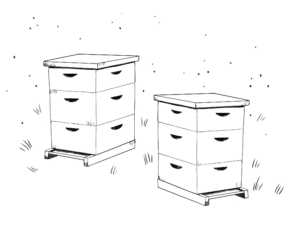
Commercial Services
Beekeeping for Your Residential Backyard
If you’d like to save bees, build a healthier environment, pollinate your garden, and have your own honey harvest, then our residential service is perfect for you! We offer turnkey beekeeping, honey harvesting, and DNA analysis designed for homeowners in a wide range of environments. Regardless of the size of your property — whether you garden on a balcony or have acres of land — we can install and manage one or several hives for you.

Residential Services
Beekeeping Education
![]()
We offer a number of educational programs at varying price points that have proven popular with commercial clients, schools, gardening clubs and organizations promoting sustainability.
Pre-recorded and live hive tours
Experience a guided tour as one of our bee experts takes you on a walk-through of your hive visits and inspections. Get a glimpse of the busy life of bees, and learn more on how to keep tenants engaged with their local environment. Live tours are available for up to 20 participants.
Meet an expert beekeeper
Participate in a beekeeper-led webinar and Q&A session. This virtual event is a great opportunity to learn about your bees through the lens of a beekeeper. We’ll discuss the data collected from your beehives, why bees matter, and what it's like to take care of your bees.
Virtual keynotes
Gain insight into the world of bees with our Chief Science Officer and Founder, Dr. Noah Wilson-Rich. Noah's knowledge of honeybee health and his passion for bee research will leave your audience spellbound, and with a wealth of new insight about our natural world. Our virtual keynote package includes signed copies of his book, The Bee: A Natural History.
We also offer free and open online programs, such as live meetings with beekeepers and educational webinars.
How Professional Beekeeping Works
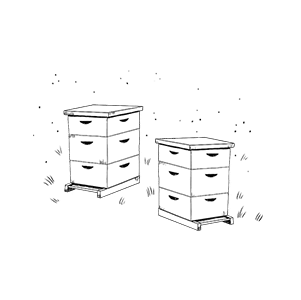
Installation
We help you choose an ideal location to establish one or more beehives at your home or workplace.
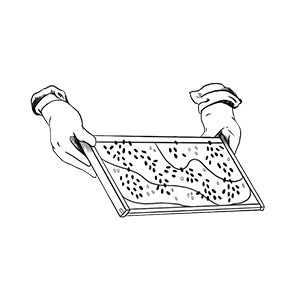
Maintenance
Our impassioned and experienced beekeepers service your beehives once a month, providing high-quality care and detailed reports.

Harvesting
You keep 100% of the raw honey produced. We’ll handle the rest— small batch extraction and bottling with personalized labels.

Research
At every visit, we collect data and share it with our research partners to advance the science of beekeeping and improve the health of pollinators worldwide.
Safe
Our honeybees, Apis mellifera ligustica, are the most docile species of honeybees, making our hives extremely safe and the instance of stings very unlikely.
We situate our hives in safe locations, secured from animal intrusion and weather damage.
Secure
Our beekeepers have extensive experience working in densely populated areas in and around Houston, and are experts at safe hive placement on rooftops, balconies, and gardens. They’ll work with you to site your hives in visible, low-traffic areas, where you can safely enjoy observing your bees as they come and go.
Insured
Our beehives and beekeepers are fully insured for personal liability and damage. We can provide you with a Certificate of Insurance (COI) if needed.

Beekeeping Laws in Texas and the Greater Houston Area
Beekeeping is legal in Texas, and state laws prohibit cities from banning beekeeping. While registration with the State Apiarist is voluntary, all hives must be imprinted with the name and address of the hive’s owner, and an assigned brand number from the State Apiarist is recommended.
All of our beekeepers are locally licensed to use pesticides and are certified for safe roof-top work.
Houston Service Area
We service hives in Houston and throughout the metropolitan area, including in parts of the following counties:
Harris County
Fort Bend County
Montgomery county
Galveston County
Chambers County
Liberty County
What's Included
- Site Evaluation
- Hand-crafted, all-natural beehive equipment installed onsite
- A colony of docile honey bees (Apis mellifera ligustica)
- Monthly maintenance visits and follow up reports
- Advanced scheduling so you can alert your team
- Full-time customer service team available by phone or email
- Raw honey, harvested and bottled just for you
- Replacement colonies provided at no cost
- Fully insured professional service
About Local Honey
Honey production varies from colony to colony, depending on the strength of the Queen, the health of the hive and the availability of nourishment. New colonies tend to produce less honey than established ones. When there is a surplus of honey, we will harvest and jar it for you.
The composition and flavor of honey varies from hive to hive as well, depending on the floral species available to pollinate. This means that honey from your hive will have a unique profile. Tasting it, you’re tasting the composite of all the flowers your bees have visited! DNA analysis of Houston area honey shows our bees the three most common species that bees are pollinating are pine trees (7.1%), clover (6.2%), and linden trees (6.0%). In spring citrus trees add a bright note to Houston honey, and Chinese Tallow, planted widely in the area, give later honey a darker color and richer taste.
In our studies of honey DNA, we’ve found that honey from urban hives includes a much wider range of species—as much as eight times more than honey from rural and suburban hives!
Many of our residential customers are planting native species in their gardens to help both honeybees and native pollinators.
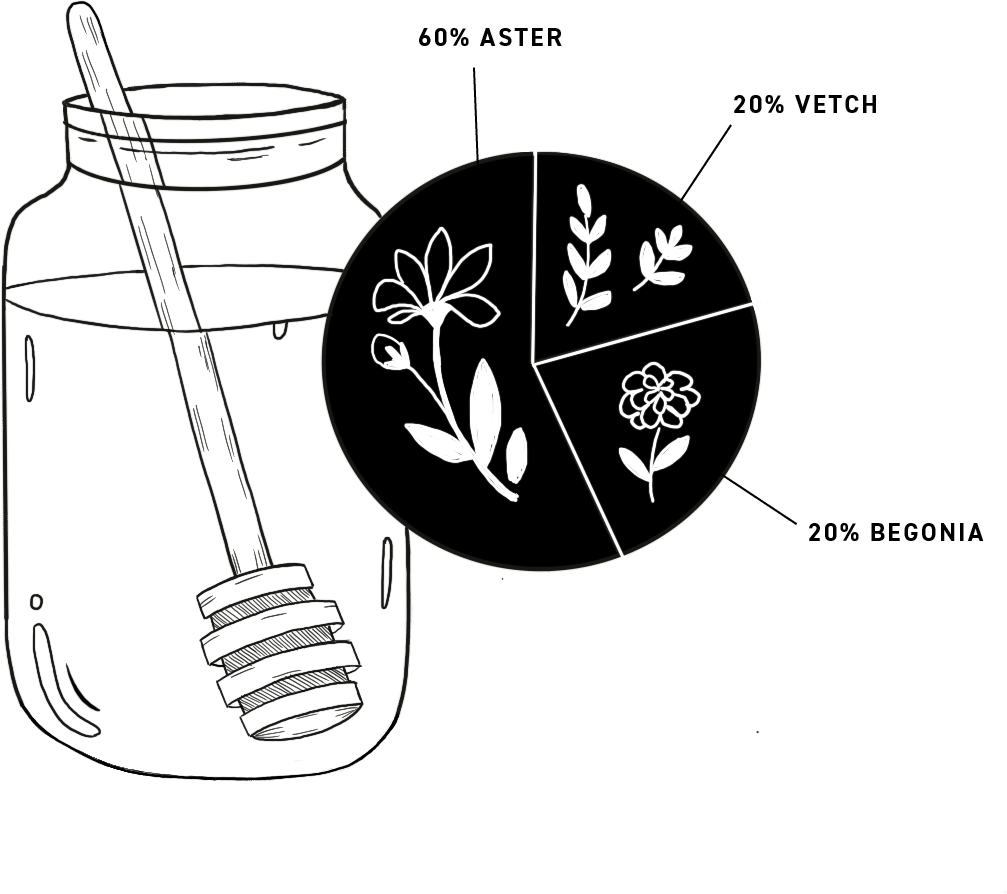
HoneyDNA
We pioneered the process of identifying the exact percentage of various pollen species found in honey through advanced genomic sequencing. Understanding where bees foraged reveals which plants best feed pollinators in the local environment.
Pollinator Friendly Plants
At Best Bees, we encourage our clients to landscape their property with pollinator friendly plants, if space allows, add ground level and roof-top pollinator gardens, and use a variety of trees, shrubs and plants that will provide forage throughout the year, such as azure blue sage, aromatic aster, and giant goldenrod, all of which work well in Houston area gardens. For a list of pollinator friendly plants native to Texas and the Southern Region, visit https://xerces.org.

Already Have a Hive?
At Best Bees, we’re proud to be a part of the local beekeeping community in every area in which we work. If not already a member of one of the area’s beekeeping associations, we encourage you to join either the Loan Star Beekeepers Association lonestarbeekeepers.org, the Texas Beekeepers Association texasbeekeepers.org, or the Houston Beekeepers Association houstonbeekeepers.org.
Join our Citizen Scientist movement! Here are some ways you can participate:
- Plant more pollinator habitats on your property
- Use bee-safe pesticide alternatives
- Get involved in local and national lobbying
- Submit your honey for HoneyDNA
You can also post your data to bee Citizen Science programs like iNaturalist, The Great Sunflower Project, and Beecology Project.
We gladly share the learning from our research and our best practices with everyone. To learn more about the findings of our research work, visit https://bestbees.com/white-paper-resources/. To watch one of the TED Talks by our Founder and Chief Science Officer Dr. Noah Wilson-Rich, visit our Research page https://bestbees.com/research/ . Finally, to stay in the loop on our latest thinking, read our blogs at https://bestbees.com/blog/.
Unique Challenges and Opportunities to Beekeeping in the Houston Area
Located close to the Gulf of Mexico in East Texas, the climate of Houston, for much of the year, is hot and humid. While heat is not a serious issue for honey bees, it is problematic for beekeepers wearing full beekeeping suits for protection from bee stings. “It can be so hot here in the summer months,” says Best Bees Beekeeper Nicole Buergers, “that I wear just a ventilated beekeeping jacket and hood.” Buergers finds this enough protection, given the docile nature of our honey bees.
Houston is prone to hurricanes, and when extreme storms are predicted, our beekeepers temporarily remove hives from exposed rooftops, and provide extra weights and straps to protect them from high winds.
Warm, humid conditions in Houston make small hive beetles a persistent problem. Our beekeepers set physical traps to catch them. Small hive beetles are more prevalent in ground level hives, which is one reason we recommend roof-top placement whenever possible.
While there are many local water sources for bees throughout the metropolitan area, to assure bees housed on skyscrapers like the Bank of America and Transwestern Tower have a consistent supply, we set up water stations on the roof taps as well.
With a short, mild winter, Houston bees are active for most of the year, and are dormant for only about two months each winter. During this brief period, our beekeepers do shallow checks to make sure the hives have enough food and are not infested with varroa mites.
Mild winters and a long growing season mean Houston area bees have access to pollen and nectar for most of the year, and can be observed foraging from late winter until late fall. Houston has one of the most diverse ecologies of any metropolitan area in the world, and so supports a wide variety of pollinators.
Bringing Innovative Beekeeping Practices to the Houston Area
With every hive a datapoint, we’re able to observe bees in a wide variety of conditions and test alternative treatments in hives across the country. This allows us to introduce successful innovations to Houston and take learning from our Houston hives to other cities – such as the lack of small hive beetles in rooftop hives.
Figuring out what environments are the most advantageous for bees is part of our mission to improve pollinator health.
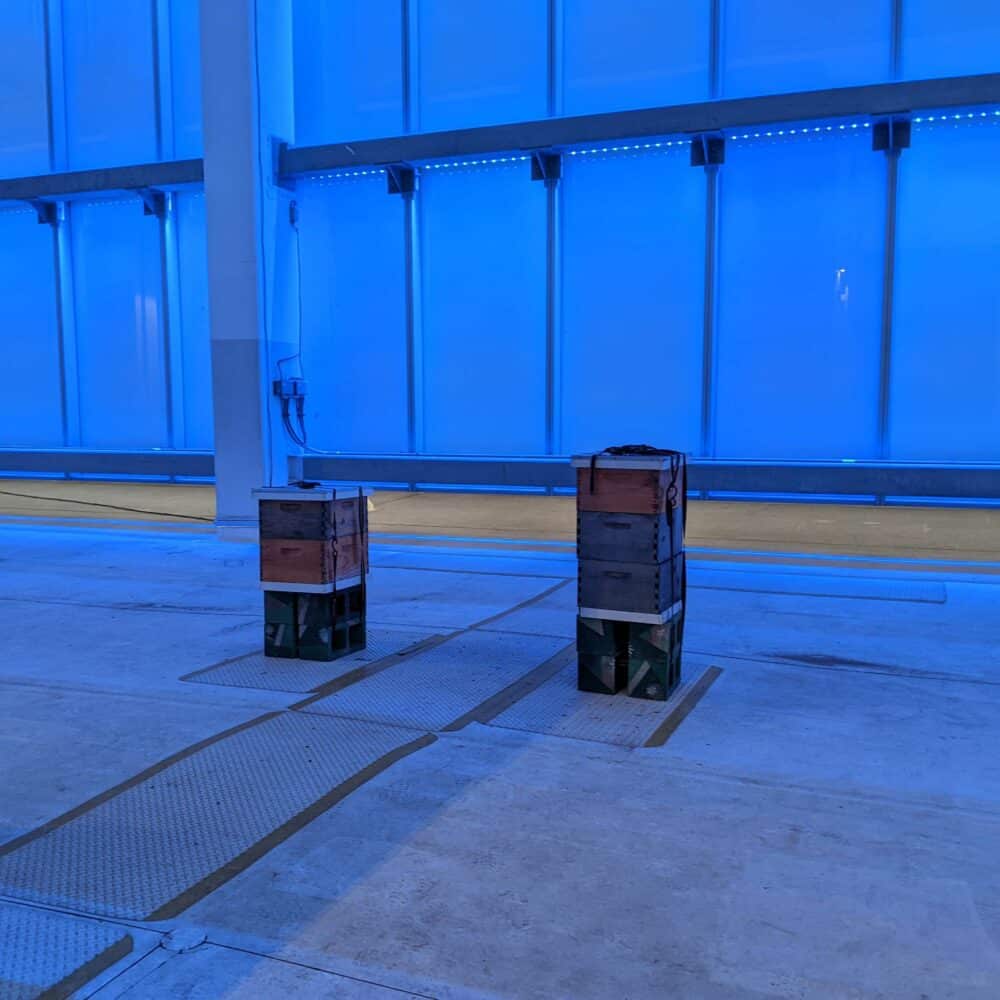
Frequently Asked Questions
We install and maintain honeybee hives on your property. Our expert beekeepers monitor the health of your bees and perform a variety of tasks throughout the year to help them thrive. At each visit, we also capture a range of metrics and share the data with renowned research partners to help the scientific community better understand the plight of pollinators. Towards the end of the season, we extract the honey and jar it for you.
About once per month for our Houston Area hives. If your bees are distressed and need extra support, supplemental visits are included. We coordinate each visit in advance and send a summary report afterward.
Only a few square feet! A beehive takes up as little as 2’ x 2’ x 3’. Our beekeepers need a few feet around the hive to access it, and the bees’ flight path will need to be unrestricted.
In the Houston area, we typically install hives when all threat of winter has passed, which is typically in late February-early Marsh. Installations after June are accommodated on a case-by-case basis, depending on our inventory levels.
We fully guarantee the health of our bees and queens. If a colony dies, we’ll replace it with a healthy one from our own stock at no additional cost.
Our Boston-based headquarters is staffed full time and available Monday through Friday during work hours by phone or email to answer any questions. When a colony requires extra attention, additional visits are made at no cost to you.
Yes, we provide a range of event support packages for our commercial clients. See Hive Programs for Commercial Customers for details.
Green roofs earn credits toward a building’s LEED (Leadership in Energy and Environmental Design) certification. Green roofs provide vegetation for water control, wildlife habitat, and better urban air quality. Honeybees can help maintain the green roofs that are becoming more common in big cities and thus contribute to a building’s LEED rating.
We service hives in the city of Hartford and throughout the area. Given that the Houston Metropolitan Area covers 9,444 square miles, we evaluate each new potential site outside of Harris County on a case-by-case basis.
We handle visit scheduling for you. We’ll contact you at least 72 hours in advance via email.

